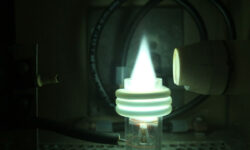Keeping An Eye On Additives
Monitoring the additive levels provides information to ensure that the proper lubricant is being used for the application and for topping off. Generally, four types of lubricants are used inmost industrial applications, and each has different additive levels. Note that an oil’s level of additives measured by spectroscopy isn’t necessarily an indication of the oil’s quality, because the pressure of the element doesn’t indicate the functionality of the additive.
✓ Engine oils: They typically contain antiwear additives composed of zinc and phosphorus. Expect to see these elements present in about 1,000 ppm (plus or minus 200ppm). A detergent package should also be present, composed of some configuration of barium, magnesium, and calcium. These levels vary depending on the oil, but are usually above 1,000 ppm.
✓ Extreme pressure (EP) oils: EP oils are typically for gear applications. You commonly see significant amounts of phosphorus.
✓ Anti-wear (AW) oils: AW oils include many bearing oils, some gear oils, and hydraulic fluids. These oils contain both zinc and phosphorus from 200 to 600 ppm. They may also have low levels of detergent (magnesium or calcium)present.
✓ Rust and oxidation inhibiting (R&O) oils: R&O oils are the easiest to identify. They include turbine oils, compressor oils, and some bearing and hydraulic oils. These oils have no additives that spectroscopy can measure, so they should have extremely low numbers for all additive metals.
Seeing low levels (less than 20 ppm) of some additives metals where they aren’t expected is uncommon. These amounts are usually the result of residual contamination in the equipment or storage tanks. Some oils don’t fit into these descriptions. Many oils are formulated for specific applications, and alternative additives must be used; for example, oils formulated for some stationary and EMD engines. In many cases, operating conditions or emission concerns call for a less traditional additive package.





